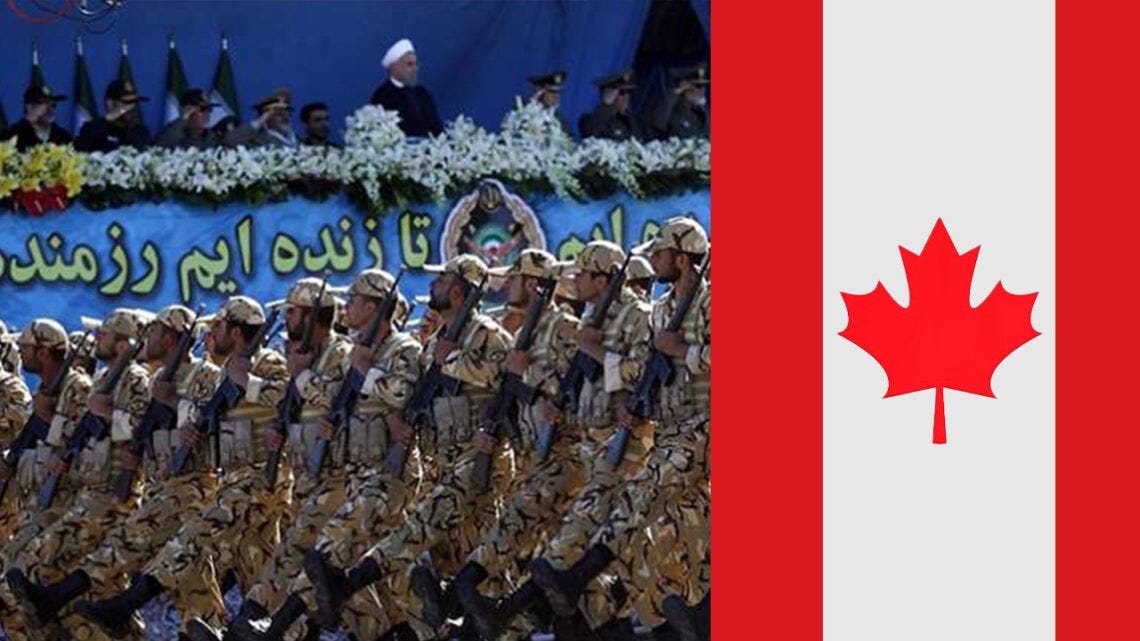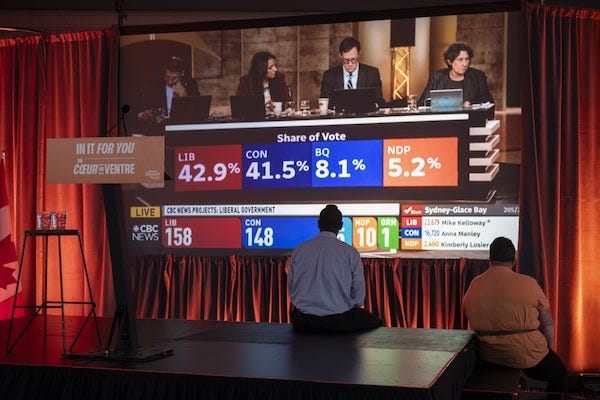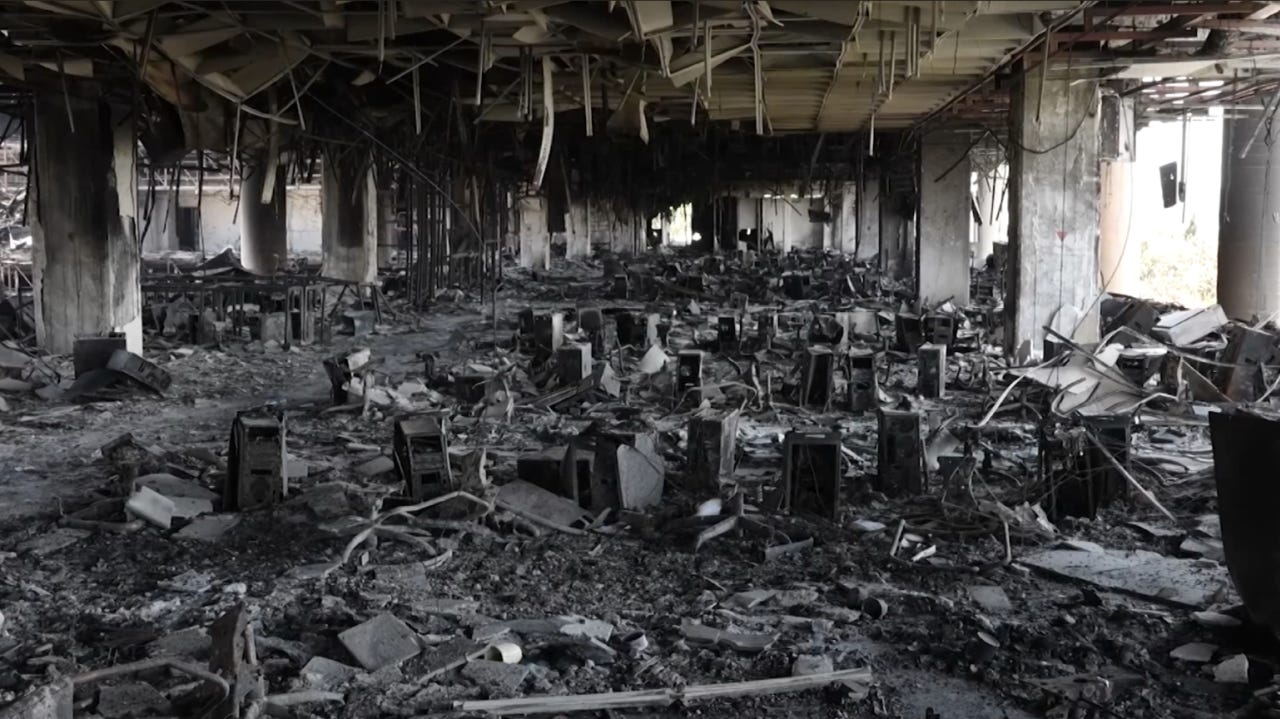Good morning, it’s Friday, June 20th. In today’s news, Canada is positioning itself—yet again—as a sanctuary for Iranian war criminals, CSIS reports that Canada’s social fabric has unravelled, CBC’s election coverage has been exposed as deeply biased, Israel—Iran conflict continues to escalate, and much more.
First time reading the daily blend? Sign up here.
Canada: A Safe Haven for Iran’s War Criminals?
As Iran’s conflict with Israel and the U.S. escalates, a troubling reality emerges: Canada is positioning itself—yet again—as a sanctuary for war criminals and regime loyalists.
Security analyst Casey Babb has sounded the alarm, warning that Iranian officials—many already familiar with Canadian immigration loopholes—could flood into Canada if the regime falls. This isn’t speculation. In recent years, at least 20 senior Iranian officials have been found living in Canada, despite laws barring their entry since 2022. Only one has been deported. The rest remain embedded within Canadian communities, shielded by the very asylum system that was designed to protect the persecuted—not their persecutors.
This includes men like Morteza Talaei, a former Tehran police chief involved in deadly crackdowns on protestors, spotted casually lifting weights in a Toronto gym. Or Seyed Salman Samani, a former deputy interior minister ordered deported by Canadian authorities. Many simply claim asylum on arrival and remain.
Iranian-Canadian activists have long warned of this. Some testified during Canada’s recent Foreign Interference Commission, describing the trauma of seeing regime figures walking freely among their families—people responsible for torture, oppression, and death now enjoying refuge and rights under Canadian law.
This isn’t just a moral failure—it’s a national security risk. Groups like StopIRGC have compiled at least 91 dossiers on suspected regime operatives living in Canada, including alleged members of the Islamic Revolutionary Guards Corps. Yet these reports too often disappear into bureaucratic black holes.
And now, as Canada faces a record surge in asylum claims—1,730 from Iranians in Q1 2025 alone—Prime Minister Mark Carney’s government is scrambling to tighten refugee eligibility. But critics argue the reforms are too little, too late.
Canada has become a soft target—not just for migrants fleeing hardship, but for elites fleeing accountability. If we do not fix our broken asylum system, we may find ourselves sheltering the architects of tyranny while their victims are left behind. Source.
CSIS Report: From Safe Haven to Soft Target—Canada’s Social Fabric Has Unravelled
Canada is no longer insulated from the geopolitical and societal pressures reshaping the world. The 2024 CSIS report paints a stark picture: the country is increasingly vulnerable to both internal fragmentation and external manipulation. A fraying social fabric—driven by online radicalization, foreign interference, and growing distrust—has made Canada a prime target for hostile actors, particularly the Chinese Communist Party and other authoritarian regimes like Iran, Russia, and India.
This isn’t just about espionage or cyber threats. It’s about the erosion of national unity and the weakening of Canadian sovereignty. When foreign states can manipulate ethnic tensions, co-opt media narratives, and even allegedly orchestrate assassinations on Canadian soil, it signals a deep crisis in national resilience. Meanwhile, domestic polarization and youth radicalization are being weaponized to turn Canadians against one another.
The government bears a direct share of responsibility for this vulnerability. Years of mass, unchecked immigration without adequate integration measures have contributed to fragmentation, parallel communities, and weakened social cohesion. At the same time, political leaders have been reluctant to confront foreign interference out of fear of electoral backlash or diplomatic fallout. The result is a system that prioritizes short-term optics over long-term national security.
What this report ultimately reveals is that Canada is struggling to define and defend its national identity. From intelligence leaks to compromised media to transnational repression campaigns, the threats are real—and growing. As global power struggles play out at home, Canada faces an urgent question: can it rebuild the social cohesion and institutional strength needed to protect its democratic foundations, or will it continue to drift as a soft target on the global stage?
State-Sponsored Spin: CBC’s Election Coverage Exposed as Deeply Biased
In an era of declining trust in institutions, an investigation by Regina-based computer scientist Daniel Paquet may confirm what many Canadians have long suspected: CBC/Radio-Canada isn’t a neutral public broadcaster—it’s an ideological machine.
Using AI tools and a rigorous, transparent methodology, Paquet analyzed 460 articles published between March 23 and April 29, 2025—split between Radio-Canada and CBC’s English-language site. He instructed GPT-4.1 to score each article on a scale of -1 (negative bias), 0 (neutral), and +1 (positive bias) toward the four main party leaders. The results were damning.
Pierre Poilievre received overwhelmingly negative coverage on both platforms. Radio-Canada ran 64 negative stories and only 14 positive, with those critical pieces featured for nearly eight times longer on the homepage. CBC was even worse: 78 negative articles and just 17 positive—displayed four times longer. Meanwhile, Mark Carney enjoyed a perfectly balanced tone in French media and a glowing 3:1 positive-to-negative ratio on CBC, with far more homepage visibility. Jagmeet Singh also received favourable coverage. Yves-François Blanchet was mostly ignored.
This isn’t just a matter of editorial discretion—it’s a systemic bias funded by taxpayers. CBC claims to uphold fairness, impartiality, and integrity. Yet Paquet’s data, compiled with no partisan affiliation and soon to be submitted to both ombudsmen, shows a broadcaster rewarding candidates who support its funding and punishing those who oppose it.
That’s not journalism. It’s institutional self-preservation masquerading as news.
Paquet has a history of internal credibility: he worked with Radio-Canada, was previously invited to serve on its 2019 federal election review panel, and has successfully lodged multiple complaints that were upheld. He is no ideologue. He’s a concerned citizen with the technical ability to expose what legacy media tries to deny.
This raises a pressing democratic question: when a publicly funded broadcaster tilts coverage to favour political allies and discredit critics, can it still claim legitimacy?
Paquet’s findings don’t just reflect unconscious bias—they suggest a deliberate editorial pattern, reinforced not just by tone, but by what gets published, how long it stays on the homepage, and what gets ignored.
In a functioning democracy, media bias of this scale—especially from a state-backed institution—demands consequences. Canadians deserve facts, not narrative engineering. Source.
Israel—Iran Conflict Intensifies: Hospital Strike, US Response Looms, Russia Warns Washington
The standoff in the Middle East is rapidly widening, pulling in global actors, straining international diplomacy, and pushing the region closer to open confrontation.
Iranian Missile Hits Hospital, Wounding 240—Israel Threatens Iran’s Leader in Response - More
White House: Trump to Decide on US Action in Iran Within 2 Weeks - More
Iran Issues Evacuation Warning to Israel's Channel 14 News Offices - More
US Airlines Pause Passenger Flights to the Middle East Due to Israel-Iran Conflict - More
White House Says Deal With Iran Must Include "No Enrichment of Uranium" - More
Israeli Military Chief Says 3rd Wave of Strikes Will Focus on Western Iran - More
Russia Warns US Against Providing Direct Military Aid to Israel - More
Iran Talks With Europeans Set for Friday; White House Sees ‘Substantial Chance’ for Renewed Negotiations - More
Firearms Buyback Program to Cost Over a Third of a Billion Dollars
The federal gun buyback program is now expected to cost $342.6 million, despite being based on wildly outdated data from the now-defunct 2012 long-gun registry. Officials admitted to the Senate that estimates for the 180,000 banned “assault-style firearms” are drawn from records that were supposed to have been destroyed over a decade ago—meaning Ottawa is spending hundreds of millions on a guess.
Of the total, $260 million is earmarked for compensation, $75 million for provincial support, and $20 million for collection logistics, with even more being spent on third-party firearm destruction. So far, only 12,000 firearms are budgeted for collection, but no one seems to know how many actually exist.
The program was launched after the 2020 Nova Scotia mass shooting, even though the shooter used illegal guns—some smuggled from the US—a fact that makes this massive spend targeting legal owners even more absurd. Meanwhile, the amnesty has been extended repeatedly and now runs until October 2025, giving the impression that even the government doesn’t know what to do next.
In short: Ottawa is burning through taxpayer money to buy back guns they can’t even count, from people who aren’t the problem. More
New US Visa Rules Require Foreign Students to Unlock Social Media Accounts for Review - The US State Department is resuming suspended student visa processing for foreigners, but will now require applicants to unlock social media accounts for government scrutiny. Officials will screen posts for content deemed hostile to the US, its government, or its founding principles. More
Spain Wants Exemption From NATO’s 5% Defence Spending Hike—Rejects it as ‘Counterproductive’ - More
Ukraine: Russia’s Military Casualties Exceed 1 Million in 3-Year-Old War - More
Finland’s Votes to Leave the Land Mine Treaty as the Nordic Country Boosts Defences Against Russia - More
Trump Signs Executive Order to Extend TikTok Deadline by Another 90 Days - More
CMHC Gives Up on Fixing the Housing Crisis—Redefines Success Instead
Canada’s national housing agency, CMHC, now admits it’s no longer possible to restore housing affordability to 2004 levels—shifting the goalposts to 2019 instead. Since then, average home prices have jumped 30% to $700,000, and rent has soared past $2,000/month. CMHC says we’d need to double homebuilding to 500,000 units per year just to get back to 2019 conditions. Without it, home prices will outpace wages, with Toronto hitting $1.9M by 2035. While boosting supply could cool the market, let’s be honest—this crisis was created by government mismanagement, and there’s little reason to believe the same people responsible will fix it anytime soon. More
Canada Announces Retaliatory Measures on US Steel and Aluminium Tariffs - The prime minister says Ottawa is introducing rules on June 30 that will limit federal procurement to using steel and aluminium from Canada and “reliable trading partners.” More
Competition Bureau Recommends Allowing up to 100% Foreign Ownership of ‘Domestic-Only Canadian Airlines’ - More
Google Likely to Lose Appeal Against Record $4.7 Billion EU Fine - More
FDA-Approved HIV Shot Hits Market, but Gilead Holds Patients Hostage with $25K Price Tag
The FDA has approved Gilead’s Yeztugo (lenacapavir), a twice-yearly injection that prevents HIV with over 99.9% effectiveness, marking a major leap in HIV prevention. Clinical trials across 4,000+ participants showed near-total protection, outperforming daily PrEP pills like Truvada. While hailed as a breakthrough, the drug's expected $25,000/year price tag raises serious concerns about global accessibility. Experts say it could be mass-produced for as little as $25, and pressure is mounting on Gilead to lower costs. Generic production is planned for 120 low- and middle-income countries, but rollout will take time.
SpaceX Rocket Explodes in New Setback to Elon Musk’s Mars Project - Starship 36 was preparing for 10th test flight from Texas when it underwent ‘catastrophic failure’ while on the stand. More
Inter Miami Become First MLS Club to Beat European Team at Club World Cup
Lionel Messi scored a stunning free-kick to secure Inter Miami’s 2-1 win over Porto, making them the first MLS team to beat a European club. The goal marked Messi’s 50th for Inter Miami in just 61 games—a pace far faster than his records with Argentina or Barcelona. The win moves Miami closer to the FIFA Club World Cup Round of 16, as Messi continues to thrive in Florida. More
Member of Irish Rap Band Kneecap Released On Unconditional Bail Following ‘terrorism’ Charge - Liam O’Hanna, 27, is accused of breaking British law for waving a Hezbollah flag at a concert in London last November. More
Real Madrid Star Mbappé hospitalized at FIFA Club World Cup With Acute Gastroenteritis - More
Former NFL RB Adrian Peterson Fights Poker Player on Video After Argument in Texas - More
Vancouver is Renaming a Street 'šxʷməθkʷəy̓əmasəm'—Good Luck Telling 911 Your Address
Ozzy Osbourne’s DNA Will Be Sold in Limited Edition Liquid Death Cans for 450 Bucks a Pop
It’s National Hike With a Geek Day… I’m only mentioning it because I can’t believe this is actually a real national day.





















Do the liberals really want to change asylum rules? Hasn't happened in 10 years